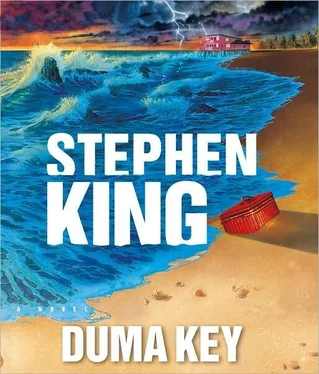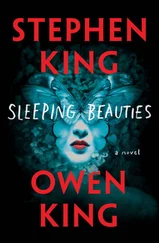“Principe certainly waved his prescription pad at me, but he wanted to offer Neurontin, and I won’t even chance that.”
“Because of your job.”
“Right.”
“Wireman, you won’t do Elizabeth any good if you go bat-blind.”
He didn’t reply for a minute or two. The road, now all but deserted, unrolled in front of my headlights. Then he said, “Blindness will soon be the least of my problems.”
I risked a sideways glance at him. “You mean this could kill you?”
“Yes.” He spoke with a lack of drama that was very convincing. “And Edgar?”
“What?”
“Before it does, and while I’ve still got one good eye left to see with, I’d like to look at some more of your work. Miss Eastlake wants to see some, too. She asked me to ask. You can use the car to haul em down to El Palacio — you seem to be doing admirably.”
The turn-off to Duma Key was ahead. I put on my blinker.
“I’ll tell you what I think sometimes,” he said. “I think that this run of fabulous luck I’ve been having has got to turn and run the other way. There’s absolutely no statistical reason to think such a thing, but it’s something to hold onto. You know?”
“I do,” I said. “And Wireman?”
“Still here, muchacho. ”
“You love the Key, but you also think something’s wrong with the Key. What is it about this place?”
“I don’t know what it is, but it’s got something. Don’t you think so?”
“Of course I do. You know I do. The day Ilse and I tried to drive down the road, we both got sick. Her worse than me.”
“And she’s not the only one, according to the stories I’ve heard.”
“There are stories?”
“Oh yeah. The beach is okay, but inland…” He shook his head. “I’m thinking it might be some kind of pollution in the water-table. The same something that makes the flora grow like a mad bastard in a climate where you need irrigation just to keep the frigging lawns from dying. I don’t know. But it’s best to stay clear. I think that might be especially true for young ladies who’d like to have children someday. The kind without birth defects.”
Now there was a nasty idea that hadn’t occurred to me. I didn’t say anything the rest of the way back.
This is about memory, and few of mine from that winter are as clear as the one of arriving back at El Palacio that February night. The wings of the iron gate were open. Sitting between them in her wheelchair, just as she had been on the day Ilse and I had set out on our abortive exploration southward, was Elizabeth Eastlake. She didn’t have the harpoon gun, but she was once more in her two-piece sweatsuit (this time with what looked like an old high school jacket thrown over the top), and her big sneakers — looking black instead of blue in the wash of the Malibu’s headlights — were propped on the chrome footrests. Beside her was her walker, and beside her walker stood Jack Cantori with a flashlight in his hand.
When she saw the car, she began struggling to her feet. Jack moved to restrain her. Then, when he saw she really meant it, he put the flashlight down on the cobbles and helped. By the time I parked next to the gateway, Wireman was opening his door. The Malibu’s headlights illuminated Jack and Elizabeth like actors on a stage. “No, Miss Eastlake!” Wireman called. “No, don’t try to get up! I’ll push you inside!”
She paid no attention. Jack helped her to her walker — or she led him to it — and she grasped the handles. Then she started thumping it toward the car. By then I was struggling out on the driver’s side, fighting my bad right hip to escape, as I always did. I was standing beside the hood when she set the walker aside and held her arms out to him. The flesh above her elbows hung limp and dead, pale as dough in the headlights, but her feet were planted wide apart and her stance was sure. A breeze full of night perfumes blew back her hair, and I wasn’t a bit surprised to see a scar — a very old one — denting the right side of her head. It could almost have been the twin of my own.
Wireman came around the open passenger door and just stood there for a second or two. I think he was deciding if he could still take comfort as well as give it. Then he went to her in a kind of bearlike, shambling walk, his head lowered, his long hair hiding his ears and swinging against his cheeks. She put her arms around him and pulled his head down on her considerable bosom. For a moment she swayed and I was alarmed, wide-set stance or no, but then she came straight again and I saw those gnarled, arthritis-twisted hands begin to rub his back, which had begun to heave.
I walked toward them, a little uncertainly, and her eyes turned toward me. They were perfectly clear. This wasn’t the woman who had asked about when the train was coming, the one who had said she was so fucking confused. All her circuit-breakers were back in the ON positions. At least temporarily.
“We’ll be fine,” she said. “You can go home, Edgar.”
“But—”
“We’ll be fine.” Rubbing his back with her gnarled fingers. Rubbing it with infinite tenderness. “Wireman will push me inside. In just a minute. Won’t you, Wireman?”
He nodded against her breast without lifting his head or making a sound.
I thought it over and decided to do what she wanted. “That’s fine, then. Goodnight, Elizabeth. Goodnight, Wireman. Come on, Jack.”
The walker was the kind equipped with a shelf. Jack put the flashlight on it, glanced at Wireman — still standing with his face hidden against the old woman’s bosom — and then walked to the open passenger door of my car. “Goodnight, ma’am.”
“Goodnight, young man. You are an impatient Parcheesi player, but you show promise. And Edgar?” She looked calmly back at me over Wireman’s bent head, his heaving back. “The water runs faster now. Soon come the rapids. Do you feel that?”
“Yes,” I said. I didn’t know what she was talking about. I did know what she was talking about.
“Stay. Please stay on the Key, no matter what happens. We need you. I need you, and Duma Key needs you. Remember I said that, when I slip away again.”
“I will.”
“Look for Nan Melda’s picnic basket. It’s in the attic, I’m quite sure. It’s red. You’ll find it. They’re inside.”
“What would that be, Elizabeth?”
She nodded. “Yes. Goodnight, Edward.”
And as simply as that, I knew the slipping-away had begun once more. But Wireman would get her inside. Wireman would take care of her. But until he was able to, she would take care of them both. I left them standing on the cobbles beneath the gate arch, between the walker and the wheelchair, she with her arms around him, he with his head on her breast. That memory is clear.
Clear.
I was exhausted from the stress of driving — I think from spending the day among so many people after being alone for so long, too — but the thought of lying down, let alone going to sleep, was out of the question. I checked my e-mail and found communiqués from both my daughters. Melinda had come down with strep in Paris and was taking it as she always took illness — personally. Ilse had sent a link to the Asheville, North Carolina, Citizen-Times . I clicked on it and found a terrific review of The Hummingbirds, who had appeared at the First Baptist Church and had had the faithful shouting hallelujah. There was also a picture of Carson Jones and a very good-looking blonde standing in front of the rest of the group, their mouths open in song, their eyes locked. Carson Jones and Bridget Andreisson duet on “How Great Thou Art,”read the caption. Hmmm. My If-So-Girl had written, “I’m not a bit jealous.” Double-hmmmm.
Читать дальше










